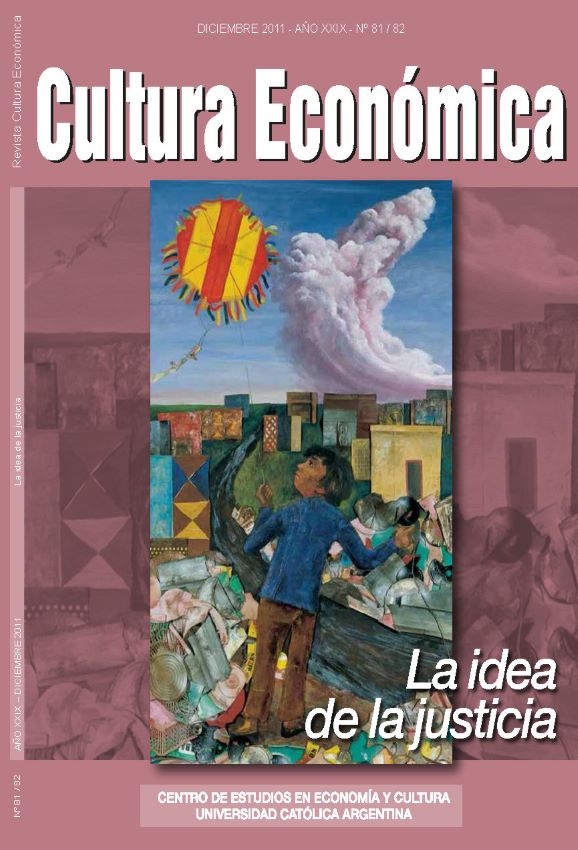A Theory of the Distributive Justice for Social and Market Interactions
Keywords:
DISTRIBUTIVE JUSTICE, JOHN RAWLS, AMARTYA SEN, RONALD DWORKIN, ROBERT NOZICKAbstract
The paper deals with the subject of distributive justice in economy, from a confronted presentation of the main ethical theories of different economists. Starting from the widely accepted concept of distributive justice, as bound to a function of the government, the author intends to demonstrate the opposite perspective, through the analysis of Nash’s method, the concept of ignorance veil developed by Harsanyi, the egalitarian ideas of Rawls and Sen, Dworkin’s responsibility concept, Roemer’s notion of equal opportunities, and finally, Nozick’s ethics in favor the voluntary distribution of resources. The aim pursued by the author is to find arguments in favor of voluntary ethics through the analysis of different models of distributive justice.
Downloads
References
Aristóteles (1996) Etica Nicomaquea, Editorial Porrúa, México.
Arrow, K.J. (1951) Social Choices and Individual Values. John Wiley & Sons, New York.
Bentham, J. (1973) An Introduction to the Principles of Morals and Legislation. Garden City, Anchor Books, New York.
Binmore, K. (1994) Teoría de Juegos, McGraw-Hill, Madrid.
Dworkin, R. (1981a) “What is equality? Part 1: Equality of welfare.” Philosophy & Public affairs 10: 185-246.
Dworkin, R. (1981b) “What is equality? Part 2: Equality of resources.” Philosophy & Public affairs 10: 283-345.
Fleurbaey, M. (1996) Théories Économiques de la Justice. Economica, Paris.
Kirzner, I. M., (1995) Creatividad, Capitalismo y Justicia Distributiva, Unión Editorial, Madrid.
Lucas, J.R. (1995) Responsibility. Clarendon Press, Oxford.
Nozick, R. (1974) Anarchy, State, and Utopia, Basic Books Inc. Publishers, New York.
Nozick, R. (1981) Philosophical Explanations, Harvard University Press, Cambridge, Mass.
Nozick, R. (2001) Invariances, the Structure of the Objective World, Harvard University Press, Cambridge, Mass.
Rawls, J. (1971) A Theory of Justice, The Belknap Press of Harvard University Press, Cambridge, Mass.
Roemer, J.E. (1996) Theories of Distributive Justice. Harvard University Press, Cambridge, Mass.
(1998) Equality of Opportunity. Harvard University Press, Cambridge, Mass.
Rubio de Urquía, R. (2003) “Estructura fundamental de la explicación de procesos de auto-organización mediante modelos teórico-económicos”, Cap. 1 en Rubio de Urquía, R., Vázquez, F. Y Muñoz Pérez, F., Procesos de Autoorganización, Instituto de Investigaciones Económicas y Sociales
“Francisco de Vitoria”, Unión Editorial, Madrid.
Sen, A. (1970) “The impossibility of a Paretian liberal.” Journal of Political Economy. 72.
Sen, A. (1981) “Rights and agency.” Philosophy and Public Affairs 11, Nº 1: 1-39.
Sen, A. (1987) On Ethics and Economics. Blackwell Publishers Ltd, Oxford.
Sen, A. (1992) “Well-being, agency and freedom, The Dewey Lectures 1984.” The Journal of Philosophy. Vol 82, Nº4: 169-221.
Sen, A. (1999) Development as Freedom. Oxford University Press, Oxford.
Sen, A. (2007) Identidad y Violencia: la Ilusión del Destino. Katz Barpal Editores, Barcelona.
Smith, A. (1997) Investigación sobre la Naturaleza y causas de la Riqueza de las Naciones, Fondo de Cultura Económica, Mexico.
Smith, A. (2004) La Teoría de los Sentimientos Morales, Alianza Editorial, Madrid.
Vara Crespo, O., Rodríguez García-Brazales, A. (2003) “El Concepto de
autoorganización en Carl Menger y en Friedrich A. Hayek” Cap. 6 en Rubio de Urquía, R., Vázquez, F. Y Muñoz Pérez, F., Procesos de Autoorganización, Instituto de Investigaciones Económicas y Sociales
“Francisco de Vitoria”, Unión Editorial, Madrid.
Downloads
Published
How to Cite
Issue
Section
License












